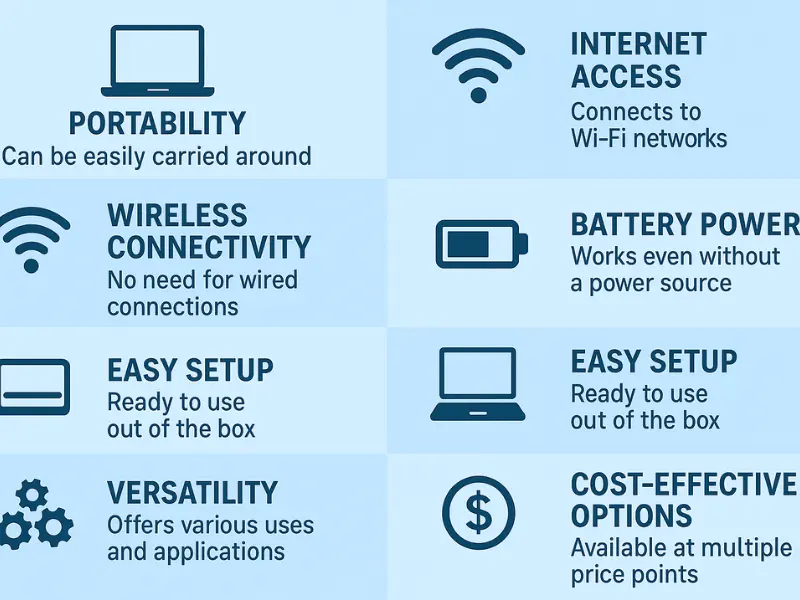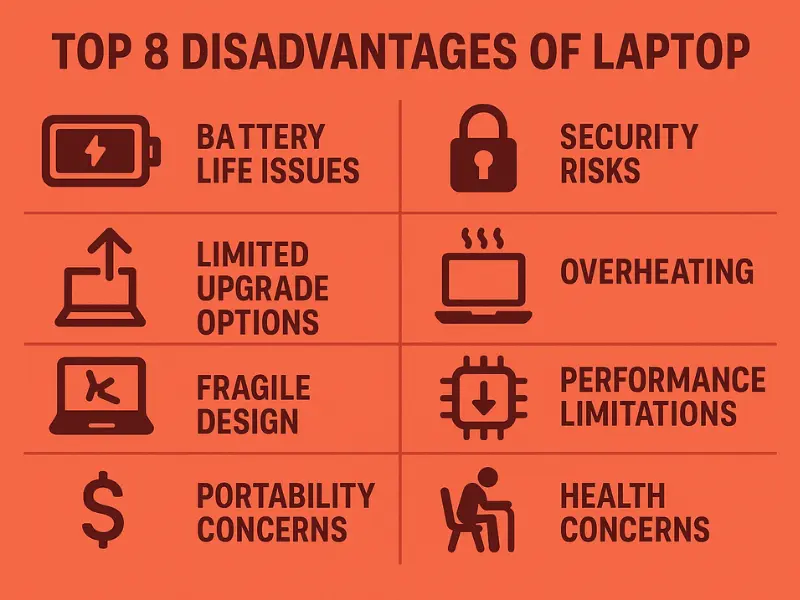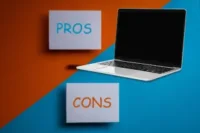Advantages and Disadvantages of Laptop: Complete Student Buying Guide That Could Save You Hundreds
Published: 2 Aug 2025
I’ve been testing and reviewing laptops for over 8 years, and I get this question all the time: “Should I buy a laptop or stick with my desktop?”
Let me be honest with you. I’ve seen people make costly mistakes because they didn’t understand what they were getting into. I’ve also watched others transform their work and life by choosing the right laptop.
Here’s what I know: Laptops aren’t perfect for everyone. But they’re not bad for everyone either.
I remember my first laptop purchase. I was so excited about the freedom it would give me. But within three months, I was frustrated with the slow performance and terrible battery life. I made rookie mistakes that cost me money and time.
That’s why I’m sharing everything I’ve learned. I want you to avoid the same problems I faced.
Here’s what you’ll learn in this guide: You’ll discover 8 clear advantages that make laptops amazing and 8 honest disadvantages you should know before buying one.
What is a Laptop?
A laptop is a portable computer that you can carry anywhere. It has everything built into one device – screen, keyboard, speakers, and battery. Think of it as a desktop computer that got shrunk down to fit in your backpack.
The main difference from desktop computers is that laptops are smaller, lighter, and run on battery power. Laptops let you work anywhere – your bedroom, library, or coffee shop. Students love them because they can take notes in class, do research, and join online classes from anywhere.
Top 8 Advantages of Laptop
Laptops offer many benefits that make them popular among students and professionals. These portable computers have changed how we work, study, and stay connected. Let’s explore the main advantages that make laptops a smart choice for many people.
- Portability and Mobility
- Space-Saving Design
- Battery Power Independence
- Built-in Features
- Wireless Connectivity
- Perfect for Students
- Easy Setup and Use
- Cost-Effective Options

1. Portability and Mobility
The biggest benefit of a laptop is that you can take it anywhere. This makes it perfect for school because you can carry it between classes without any hassle. You can study anywhere – in the library, park, or your favorite coffee shop. When you need to work, there’s no setup needed. Just open it and start working.
2. Space-Saving Design
Laptops take up very little space compared to desktop computers. This is especially good for small dorm rooms where you have limited desk space. Since everything is built into one device, you don’t need extra equipment. Your workspace stays clean without messy cables or separate parts.
3. Battery Power Independence
One of the great advantages of the laptop is that you can work without being plugged into the wall. During power outages, you can keep working while others can’t use their desktop computers. Most laptops last 6-8 hours on one charge, which covers long study sessions.
4. Built-in Features
Everything you need comes included with your laptop. The webcam is ready for video calls and online classes. The microphone lets you record audio or join meetings. Built-in speakers let you listen to music, videos, and lectures. Wi-Fi connects you to internet wirelessly.
5. Wireless Connectivity
Laptops connect to internet and devices without cables. You can use Wi-Fi everywhere – at school, home, cafes, and libraries. Bluetooth connections let you pair with wireless headphones, mouse, and keyboard. Easy file sharing lets you send files to phones and other laptops.
6. Perfect for Students
Laptops are designed for educational needs. You can type notes much faster than handwriting. Research becomes easy with access to millions of websites and online libraries. Online learning works perfectly with built-in cameras and microphones for remote classes.
7. Easy Setup and Use
You can start using a laptop right out of the box. There’s no assembly required like desktops with many parts. Most laptops boot up in under 30 seconds, so you don’t waste time waiting. Automatic updates keep your system current with the latest features.
8. Cost-Effective Options
There are affordable laptop choices for every budget. Good budget laptops are available under $500, and many brands offer student discounts. One laptop can replace multiple devices, giving you all-in-one value. Laptops use less electricity than desktop computers, lowering your bills.
Top 8 Disadvantages of Laptop
While laptops offer great benefits, they also come with some challenges. Understanding these disadvantages helps you make a better decision about whether a laptop is right for your needs. Here are the main problems you might face with laptop ownership.
- Limited Upgrade Options
- Higher Cost vs Performance
- Overheating Problems
- Battery Life Issues
- Small Screen and Keyboard
- Fragile and Breakable
- Theft and Security Risks
- Performance Limitations

1. Limited Upgrade Options
You can’t easily improve your laptop later. Most parts are permanently attached, so you’re stuck with the original specs. Usually, you can only upgrade RAM and storage. Graphics card upgrades are impossible, so gaming performance stays the same.
2. Higher Cost vs Performance
Laptops cost more than desktop computers with the same power. You pay a price premium for the portable design, getting less performance per dollar spent. This can strain student budgets since laptops are expensive for cash-strapped students.
3. Overheating Problems
Laptops get hot and slow down during heavy use. When they get too hot, the processor slows down to protect the parts. The hot bottom makes using the laptop on your lap uncomfortable. Heat damages laptop internal components over time, reducing the laptop’s lifespan.
4. Battery Life Issues
Batteries don’t last forever and cause many problems. You need to charge your laptop every day or two. Battery degradation means it holds less charge as it ages. Sudden shutdowns happen when the battery dies during important work.
5. Small Screen and Keyboard
The cramped workspace affects comfort and productivity. Small screens cause eye strain because they force you to lean closer to see clearly. Compact keyboards cause finger fatigue during long typing sessions. Limited screen space makes it hard to have multiple windows open.
6. Fragile and Breakable
Being portable means more chances for damage. Screen cracks easily from falls, which is expensive to repair. Screen hinges break with heavy use over time. Keyboard keys can pop off or stop working if you’re not careful.
7. Theft and Security Risks
Laptops are easy to steal because they’re portable and valuable. When your laptop gets stolen, you lose all your personal files and school work. Once stolen, laptops are difficult to track and rarely recovered.
8. Performance Limitations
Laptops are not as powerful as desktop computers. Mobile processors are weaker than desktop versions, so everything runs slower. Graphics limitations mean you can’t run high-end games smoothly. Multitasking struggles happen when you try to run many programs at once.
Who Should Buy a Laptop?
College students love laptops because they can take notes in class, study anywhere, and join online classes from their dorm. High school students use them for research, presentations, and typing essays faster than handwriting.
People who travel often need laptops to work during flights and stay productive on the road. Remote workers enjoy the flexibility of working from home, cafes, or anywhere with Wi-Fi.
Casual users find laptops great for browsing social media, watching Netflix, online shopping, and staying connected with family. The benefit of a laptop is the convenience it provides.
Consider desktops instead if you:
- Need maximum performance for video editing or gaming
- Have a tight budget (desktops give more power for less money)
- Work at one fixed location only
- Want to upgrade parts later
Who Should Avoid Laptops?
Skip laptops if you are:
Hardcore gamers: Gaming laptops cost much more and overheat during long sessions
Professional video editors: Slow rendering, small screens, and overheating problems
People with health issues: Neck pain, wrist strain, and back problems from poor posture
Multi-monitor users: Laptops support only one external monitor usually
Budget-conscious buyers: Desktops offer better value and cheaper repairs
Laptop Care Tips for Students
Keep it clean: Use microfiber cloth for screen and compressed air for keyboard. Clean air vents regularly.
Carry safely: Use padded laptop bag, close screen gently, wrap power cord properly, keep dry in rain.
Battery care: Avoid extreme heat, don’t always charge to 100%, use regularly, enable battery saver mode.
Stay updated: Install security updates, use antivirus software, update drivers, backup files regularly.
Backup everything: Use cloud storage like Google Drive, keep USB backup copies, set automatic backups.
The advantages and disadvantages of the laptop computer help you decide what’s best. Consider your real needs, budget, and lifestyle before choosing. Make smart decisions based on facts, not trends.
Conclusion
Advantages and disadvantages of laptop computers are clear when you look at the facts. Laptops offer amazing portability, wireless connectivity, and the freedom to work anywhere. They save space and have everything built-in. Perfect for students, travelers, and remote workers.
But the disadvantages of laptop use include higher costs than desktops, limited upgrade options, and overheating issues. Small keyboards, weak batteries, and expensive repairs are real problems.
Should you buy one?
The advantages of laptop computers win if you move around a lot. But if you work at one desk and need maximum power, desktop computers work better.
Understanding both laptop advantages and disadvantages helps you make the right choice for your needs and budget.
Ready to decide? Share this guide with friends. Got questions? Comment below for personalized advice!
Also Read this 👇👇
Advantages and Disadvantages of Modern Speakers
Pros and Cons of Thin and Lightweight Laptops
Advantages and Disadvantages of Computer Keyboards
Laptop vs Desktop: Pros and Cons
Advantages and Disadvantages of Internet for Students
10 Reasons Why Every Student Should Own a Laptop
10 Incredible Benefits of Laptops You Need to Know
How to Use a Laptop for the First time
Pros and Cons of Using a Computer Mouse

- Be Respectful
- Stay Relevant
- Stay Positive
- True Feedback
- Encourage Discussion
- Avoid Spamming
- No Fake News
- Don't Copy-Paste
- No Personal Attacks

- Be Respectful
- Stay Relevant
- Stay Positive
- True Feedback
- Encourage Discussion
- Avoid Spamming
- No Fake News
- Don't Copy-Paste
- No Personal Attacks





